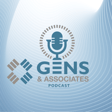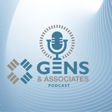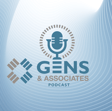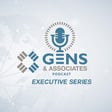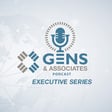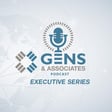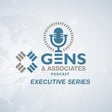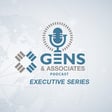Become a Creator today!Start creating today - Share your story with the world!
Start for free
00:00:00
00:00:01

Executive Series Episode #9 - Max Kelleher (Generis)
Welcome to The Gens & Associates Podcast: Regulatory Executive Series. This exciting series features Steve Gens, G&A Managing Partner, conversing with key regulatory senior executives that represent the software and services sectors. These informative one on one conversations will explore how they are guiding their organizations to effectively support key industry initiatives and technology advances.
In today’s episode, host Steve Gens is joined by Max Kelleher (CEO of Generis) to discuss innovations in the CARA Platform, how internal company culture reflects customer satisfaction, and Generis’ exciting future.
Transcript
Introduction to Regulatory Executive Podcast
00:00:00
Speaker
Hi, this is Steve Gens, Managing Partner of Gens & Associates, and welcome to our Regulatory Executive Podcast Series. I'm excited today to have Max Culliner, CEO of Generis, with us. So welcome, Max, and certainly it's been a big year for Generis, yourself too. um I know I really enjoyed the conference that you had, I think the first one post-pandemic.
00:00:25
Speaker
in Lisbon. um It was an excellent event event. So before we get started, could you give our listeners a quick introduction of yourself and maybe just a brief history of generis? Because I know I started to get to know you guys ah back in the 2000 2001 timeframe. So if you could do a quick intro on max, then we'll get started.
00:00:48
Speaker
Yeah, yeah, absolutely. Thanks, Steve. Well, I guess first thing I just want to say thanks for having me on, obviously, um on this ah prodigious podcast. I know it's really flying. I've been seeing it popping up all over LinkedIn um and you're doing an awesome job with this and and of course, John as well. So thank you for having me on. Really appreciate that.
History and Evolution of Generis
00:01:11
Speaker
Yeah, I'll introduce myself. I'm Max Callagher. I'm CEO at Janaris. Some of you, maybe most of you, will think, I kind of know that last name, but I know it James Callagher, and that would be my father, who is now president of Janaris.
00:01:26
Speaker
So ah yeah, James has been a big name in industry for for quite a long time. um And I joined the company about eight years ago. Obviously, I kind of grew up around the company, literally. oh So I would say I've been with generis ah pretty much my whole life, for better or for worse. um But yeah, earlier this year, I moved from the the CEO role into the CEO role. And so I tell you,
00:01:55
Speaker
maybe just for for the listeners who don't know so much about generis, maybe a little background on who we are. I mean, we've always been the kind of the the classic David and Goliath battle story, if you will. So we were founded in 1998 doing consultancy work. And at that point, it was really i mean it was really James and and a couple other folks who were doing consulting work around content management in the regulatory space.
00:02:21
Speaker
um And at that time, as it, you know, times don't change with with something like Documentum. At that time, Documentum was a large name and industry as it still is today. And James was working on a project with Bristol-Myers, ah BMS in in the US. And they asked, hey, we don't have, we don't like the front end to Documentum.
00:02:49
Speaker
We need something that's more flexible. We need something that gives us more usability, um more configuration, more options essentially. And they ran an ah RFP process and it was some company versus James and james and another guy essentially. and And James and another guy won. And that really started Janaris back in 2001. I mean, that was the pivotal moment for us.
00:03:18
Speaker
And yeah, well, to this day, um you know, BMS are still a customer of ours, which is fantastic. I mean, it's pretty unheard of in this industry to have someone use your software and its updated iterations, you know, over over a span of 20 some years.
00:03:38
Speaker
um But moving on from there, um we essentially, we modernized the software in about 2008 and released Cara version three. um And we had, we were probably about 15 or so people and ah and a handful of contractors at that stage. And in in full transparency, at that time,
00:04:03
Speaker
Business was, let's say, recreational in a way. It was it provided a a lifestyle for everybody who worked there. That that was fine. That was great. And and nobody nobody was kind of trying to push to grow the business into into the mega business that it's becoming today.
00:04:27
Speaker
um it was really just kind of an occupation. That started to change. Well, i'll I'll certainly give a shout out to so Viva actually, um maybe unexpectedly, but there we go. um because Because of the cloud, right? Because of SaaS and what that brought, that brought the expectation that you have continuous improvement, that you have upgrades and things. So suddenly there was this pressure in the industry and and and frankly,
00:05:01
Speaker
I, my brother and I had gone off to university and James had a little more time on his hands um and so he really started to build the business there and that was around 2016 I guess when when we had our first version that was that was cloud ready and you know it took it was a learning curve that was a huge learning curve I mean I think it's one of the the pivotal moments for most software companies moving from perpetual on-premise licensing and stuff to providing full service for a customer and all of the you know the security implications, understanding what you need to do in order to keep that customer's data safe and so on. And of course, we've been helped over the years by improvements from AWS and and things like that. um But that was a huge jump back in back in kind of the mid teens.
00:05:54
Speaker
um before we released then Kara 5 which lost Documentum so we took Documentum out of the stack and we are standing on our own two feet really for the first time here with this new product that did everything we did before but kind of our way and that really also heralded the move from kind of traditional just content management use cases also into ah records management based use cases and data management use cases and those those sorts of things.
Launch of CARA Life Sciences Platform
00:06:35
Speaker
The things you need essentially to enable RIM. um And so in about, well, about three years ago, two, three years ago, we released what we call CLS conveniently, because otherwise it's quite long, the CARA Life Sciences platform.
00:06:51
Speaker
um And with that, the aim was to to cover off, again, those to create a digital twin of all of the critical business processes, crossing R and&D, operations, manufacturing, et cetera, for the life sciences industry. And we took basically that previous 20 years of experience building these systems for all of the individual customers and brought them into this single platform. So that that was one hell of a milestone. I mean, that really transformed us as a company. you know We're now well over 100 people. um It transformed what we needed from the product. It transformed our delivery, our service model, everything. But it really also transformed
00:07:42
Speaker
how we looked at customers and the relationship there in providing continuous value, in providing innovation, not just when they come around and ask for it, but actually building constantly into the core product to continue giving that value basically.
00:07:59
Speaker
um And I became CEO, yeah, as Steve said. Yeah, it's, ah as you say, it's it's it's pretty recent. So, um start of this year. um And yeah, we're...
00:08:13
Speaker
growing still very, very quickly at this point. um You know, we're very, very profitable, very proudly independent. and We always have been, you know, we've got no external investment, no debts, but yeah, we're a hundred percent family business. um My brother works for the company as well. um Really, that's us, I guess, Steve.
00:08:34
Speaker
uh... great and i think that's just such a uh... rich history and it brings me out back as uh... before i started the uh... the company in two thousand five i started at first consulting group in two thousand so we had our mutual uh... princeton client uh... if you will and you know as first consulting group brought kind of the same business issue that people like document on but they didn't like the front end and i know at first consulting group is No, the thinking was we're getting the same requirements for customized document and why don't we make a product? So I think around the.
00:09:07
Speaker
the same time that Generis built CARA, you know, we built first consulting group and probably I were kind of friends, a little competitors in those days, because I know and you know, as we started doing our first studies when I formed GANS & Associates in 2005, you know, Generis was always strong, even our first study was in 2007. So that kind of goes with I think the 2008 milestone where you had Cara 3, a formal organization with 15, but some very impressive logos um as far as the companies um that adopted the platform and didn't adopt for you know first docs. Because I think by then, in 2008, is people just weren't doing custom document them anymore. It was generis. It was you know kind of the you know first docs with first consulting group. but
00:10:00
Speaker
You know, certainly with Viva, kind of like you said, changed the game with, you know, kind of the cloud, which people were very skeptical and it's such a standard, you know, these days and really to be cloud ready.
00:10:13
Speaker
um the The other thing I want to go a little, ah just a little bit more about what you guys do that maybe some of the listeners don't, that although you've been full in on life sciences throughout your whole heritage, I think some listeners might not realize there's some other regulated sectors that um that and not having a solution set, but that core document management platform you have almost like a replacement of documental in some other industries. So do you want to just say a ah couple of words about some of the other regulated industries that you guys have been successful in?
Generis in Other Regulated Sectors
00:10:48
Speaker
Yeah, absolutely. And and it's it's not only content there, it's it's also the records and and the data. I mean, CARA is used for some pretty crazy things. and So, you know, we have we have an inmate management system, for example, ah which essentially takes records of inmates at a state level ah facility in in the US and manages kind of their HR information. We have a company uh you know sargento who are they again in the states uh they're known largely for their cheese um so they are busy using our system uh on the quality side for sure but also with some some crazy kind of use cases like when they have uh
00:11:38
Speaker
but they call their chefs out on the road taking information for new recipes and things like that, they they will use the car mobile application for that. ah Ditto in government, you know we have a number of very large government customers who use us Well, they kind of describe it like they have 20 to 25 internal customers. So that would be something like health, sanitary, et cetera, et cetera, police, whatever. And all of them are using CARA court documents for um for case records, for managing parking infringements. I mean, it's it's a massive variety of use cases outside of life science that people leverage the CARA platform for. And that makes up like,
00:12:26
Speaker
today about 30-35% of our business um so absolutely I mean we started in life sciences so We ended up in life sciences. Could we have started in aerospace and carried on? You know, would we be sitting here having this conversation Steve? I don't know but um But but yeah, I mean it obviously life sciences has been great to us and still our our primary focus but those other industries are incredibly important to us and You know, we're we're really looking into growing those as well now that that's great and I think that's very helpful, you know because from our
00:13:06
Speaker
regulated if it's you know kind of the content side or even ah the data side that the ability to span and scale in different areas that are regulated, it's it's pretty actually pretty straightforward. Pretty interesting these days. Yeah, so I'm going to switch gears too, because ah with some of the other kind of leaders that I podcast, there's only only been two others over the past 25 years where, and certainly over the last 15 years as we track it,
00:13:35
Speaker
in our benchmarks. It's always interesting on our side because we know with the software providers and even some of the service providers when we do this study every two years, what's the customer satisfaction level? Where are we going to be on the innovation index? And that's something I look at pretty quickly, like what are industry's views on all the different software providers. But, you know, Generis is one of three companies.
00:14:00
Speaker
ah The other ones, one of your dear partners in Expedo, and the third is actually Lorenz, and you guys integrate with Lorenz you know quite a bit on the publishing, and so great is that over yeah that over time that there's been solid, consistent, strong customer satisfaction and innovation scores.
00:14:19
Speaker
Whereas others have gone up and down or some of your other ah companies that you know used to be your competitors or maybe still are your competitors, they've declined ah greatly. and A lot of it is not being bought, you know, so having that consistency and the the ownership is important. But if you can tell our listeners, you know, for me, it's more of a statement of internal culture about quality, you know, the the customer focus and the fact that at generis, it's been very consistent for 15 years is is really excellent. So it's almost max. I'm asking kind of what's the secret sauce? What's the that the cultural aspect?
00:15:02
Speaker
internally or maybe certain processes you have that these scores are consistently high over time. Yeah I mean part of that as you say part of that is is continuous leadership so you know James James has always set a standard that I try to follow that I hope I also set and other people try to follow and they also set right.
00:15:26
Speaker
um but But I mean, we we genuinely care as outrageous as that is to say as CEO of a business, sure, whatever, everyone could say that. But you know we we really do care about our customers as well as we really do care about each other. um you know When people are working on projects and they're working with customers or when they're working on the product,
00:15:51
Speaker
they didn't really report to me, they report to the customer and they know that. We all know that. And ah because of that, we can basically move mountains internally um in order to to keep that customer happy. And that's that's pretty much, that's always been absolutely number one. And that, I mean, that's, that it's so ingrained in who we are and and how we operate. If you, I mean, my reminds me of my, um somewhat frivolous LinkedIn bio, which is something like making ridiculously good software to make people basically not hate their lives at work.
00:16:30
Speaker
ah yeah It's frivolous, but you know me and i I stand by it because I know essentially every every single human who works at generis has been handpicked and they've fought and kind of remained at generis on the merit of their own brilliance. And I also know that they all have my back, which is kind of a rare and beautiful thing. um And I certainly rely on it and I certainly have their back. so Yeah, it doesn't matter that we're but we're growing. ah That hasn't, thank God, and we've worked hard to make sure, but that hasn't adjusted that culture. And we we just adamantly insist on only having excellent people, and we help them to propagate that kind of as much as possible. I think, be yeah mean you'll know this to be true even if maybe it's too late to admit it, Steve, but,
00:17:27
Speaker
um The kind of development and innovation, it's always stymied if you have to deal with kind of meh people. um And and we just we just we just basically don't tolerate that. We're so we so focused on having that quality, as you said, and that type of individual working with us as a team, because you you wouldn't want to go through a workday any other way. Intrinsically, I guess we've we've never let go of that that idea that when you're a small company, you do it for the love of, hey, it's something you want to do. You want to work with these people. Um, and you know, it's important
Cultural Focus and Future Expansion
00:18:08
Speaker
to have that. We also have probably, I think one of the highest levels of the the boomerang effect in our industry, which is essentially what, you know, where an employee will go away, leave the company.
00:18:21
Speaker
and then come back a couple years later. um We have a tremendous amount of that. So that's that's that's absolutely really important to us. But I guess you did mention something key there, which is also the partners.
00:18:33
Speaker
you know, we invest in them and we listen to them. Again, we're super selective about that. So we really choose the people again that we want to work with because inevitably those people will then work on customer projects and guess what? The customers are going to want to work with them too. So if you start by just kind of approaching a faceless organization and saying, yeah, we'll train you this stuff and then you can go do that. and You don't know who's responsible for delivering things.
00:19:02
Speaker
then you're not going to have a great partnership, you're not going to have a happy customer. So it's it's all about investing in the right people, giving them the space and freedom to to innovate, um having their back and and then our customers benefit from that. They see that, they join us and kind of we're successful together.
00:19:22
Speaker
yeah Yeah, thanks ah for that, um Max. Very yeah interesting and intriguing as as I'm you know having my notes here because you know in any smaller company, because you have the argument whether you know a larger software provider or smaller, when you're smaller, you should be able to give that personal touch. You can move more quickly.
00:19:40
Speaker
But what really resonated, and I know this because some of our the other executives and generists, you know, at your ah conference and we were talking with them, they really, what what you mentioned, the hand-picked talent, you know, that super smart people, you know, some of them you might be taking a risk, but there's a certain type of cultural of collaboration, ah figuring things out as a team. And I don't really think um I've heard before from a software provider, um I think it's very powerful what you said that, hey, you report to the customer first. It's almost like that's where the solid line is and the dotted line is internally. And that's um that that's customer focus. I mean, that really, you know, at its core.
00:20:26
Speaker
If you have the right people, you know the right team, how they collaborate, and you're very focused, you can do amazing things. So I really, really like that i kind of review on that. And that brings us to, I think, the ah the final point. And it's really, really a ah fun question for you, because although you know you've been with generis for, I think you're saying, six or eight years, you know taking the ah the role you know ah from the COO to CEO earlier this year. um So this is new, it's you're guiding the boat now, right? So what excites you most about the organization, you know, kind of in the coming years? um So take it away.
00:21:08
Speaker
Yeah, I love this question for us because, because we've been blessed. I mean, we've been blessed in that we have a platform that we have touched on like 10% of the potential of, I mean, the potential market for, as you said earlier, right? Okay. Well, actually this can easily apply to any regulated process, any regulated industry.
00:21:35
Speaker
we We basically haven't even started yet. I mean, that's that's what's exciting. um i've got I've got James as president. I've got incredible support from my C-level team. I mean, really, as you said, just incredible people who I can trust.
00:21:52
Speaker
to help scale this as well. But but fundamentally, you know I look at it like it there's a room there's like a room full of levers, right? And life science is ah it's pumped up. It's right up at the 80% mark there. um We got financial services gently creeping up to like 20% power. But we've there are there's like the whole rest of the room is full of levers. We haven't even touched yet, right? There are some in the dark in the shadow over there in the corner that we don't even know what they are.
00:22:22
Speaker
To be honest with you, but but the the universe of possibility for for where Cara can apply and improve efficiency for these businesses, it's it's wild.
00:22:37
Speaker
so You know how do you how do you how do you then move from that understanding which i guess i've kind of always had to a. Well we need to focus on something right it's a criticism many people have always thrown out yet cara right the software that can do everything yeah it's it's very hard it's hard to market actually steve like that's that's the fundamental chorus.
00:23:00
Speaker
how do you How do you dial it down and speak the language of these businesses so that they can understand the value without getting caught up? and passionately rambling about how it can basically do anything. right so So that's why CLS, the Car Life Science Platform, is a beautiful thing for us. we know We know we understand the industry incredibly well. We know the business processes. We know what we've added so far. We know what we can add in the future. And there's a really long runway for us with that platform to add in all of these additional
00:23:37
Speaker
processes and use cases, which by the way, for existing customers, you know we we operate this kind of one user, one license policy. So a user of the platform can essentially use the platform for any of the processes, maybe but whether it's a regulatory process, whether it's quality, whether it's safety, clinical, what legal, whatever.
00:23:57
Speaker
So that means we're kind of, you know, we're kind of rolling out a lot of this stuff for almost for free for some of those existing customers, but but there's so much um for us that that we can add in value and that we can be really specific with in life sciences. So it helps that we have some incredible kind of lighthouse, I would say more than lighthouse collection of the beacons of Gondor in terms of um ah life sciences customers who who can have a back, who can give us the information. And again, those partners who can give us that information help people like you, Steve, who can give us that information and and that additional insight that keeps us on the right track, that keeps us innovating. So that's that's really clear for us. But then,
00:24:48
Speaker
back to the levers what do we do with all these levers right that's that's what's incredibly exciting so i've got kind of crack squads at the moment going around creating go-to-market plans in financial services in government as our as our next two um kind of big industries to hit and we're going to be able to do that i don't want to say quite easily you know i should i'll be naive if i would say that there are always going to be new competitors et cetera, there's always going to be that hurdle of understanding the new spaces that we're going into. But again, we've already got lighthouse customers within those industries who can who can help us grow this. It's always just been, you know, if we were kind of, you know, some big PE backed, whatever, with chunks of money being thrown into building massive sales teams, sure, we probably could have done this 10, 15 years ago.
00:25:42
Speaker
Did we want that? No. um So the reality is, where we are as we grow organically, now is that moment, now is that tipping point where we can say, do you know what, time to expand that, time to push that lever up a little bit. Let's push that up to 40%. And the the compounding growth that that's going to give us is is really incredible. I mean, yeah, so i'm there's tons for me to be excited about I guess is the short story but really it's the ideology you you wake up and every day you want to get to a place where you have
00:26:22
Speaker
made the world understand the capabilities of this platform. That's what it's like working at Generis. It's how can we tell them the the freedom and the possibility that they have with this? How can we convey to them kind of this gem, this powerful core foundational thing that they can use to transform their whole business? So it's about spreading that ile ideology as much as it is you know growing life sciences or or car life science but ah platform is growing the understanding that you don't have to think in these boxes anymore. That you're pushing industry to take a platform that enables accurate and consistent information management and dissemination rather than a tool for this, a tool for that, a tool for this, a tool for that.
00:27:10
Speaker
um so Yeah, I don't know. It feels great right now, to be honest with you. there you know There is this powerful, mature competitor to the orange folks in life sciences, but we've also got all these other levers. um And that just puts us in a great spot right now.
00:27:31
Speaker
Well, that's ah certainly very exciting. um Certainly um being at the at the conference, you know you could feel that excitement you know at the ah the future too. And you know being in this sector you know for so long myself, um you know there's few companies you know that that certainly have earned my respect and that that is earned over time.
00:27:52
Speaker
right that, you know, for me, that respect comes from help helping to innovate the ah the sector. So there's very few companies over the last 25 years, you know, were truly, you know, pushing the dial, moving the dial. There's a lot of companies that are excellent companies. We call them steady partners. You know, they're they're there. They're helping. But who are, you know, the companies that are, you know, kind of pushing us? out pushing us you know forward. So with that said, appreciate the at the time. Maybe some of our listeners want to get ahold of you and I don't know if it's through LinkedIn, through your website. So do you want to say um kind of the best way to get ahold of you real quick and then I'll have some final comments.
00:28:35
Speaker
hit me up on LinkedIn. but That works works very well um but yeah absolutely I mean you can of course reach out um to our email at info at generiscorp.com or go to the website at Well, carlifesciences.generiscorp.com, if you're interested in, of course, the Car Life Science Platform. um But yeah, um just reach out on on LinkedIn.
Closing Remarks and Contact Information
00:29:02
Speaker
um And yeah, I want to say massive thanks as well, Steve. This has been really fun. It's my first podcast, but I've had a great time.
00:29:10
Speaker
Yeah, I mean, we've been really enjoying the the podcast and this series, like you said earlier, has been a great hit on that. And it's all about, you know, kind of sharing and learning, you know, as a community, and it's rare that, you know, kind of everybody that's out there can hear first firsthand from, you know, leaders, you know, CEOs, founders and all that. So for our listeners, um you know, any questions you have for us, ah you can go into LinkedIn also, or we have our contact page off the website.
00:29:41
Speaker
So closing it up, Max, thanks again so much and best wishes, you know, as you've taken the reign. That's a very ah big milestone for the company and yourself. um But it sounds like a very exciting future. So thanks again. Thank you, Steve.
